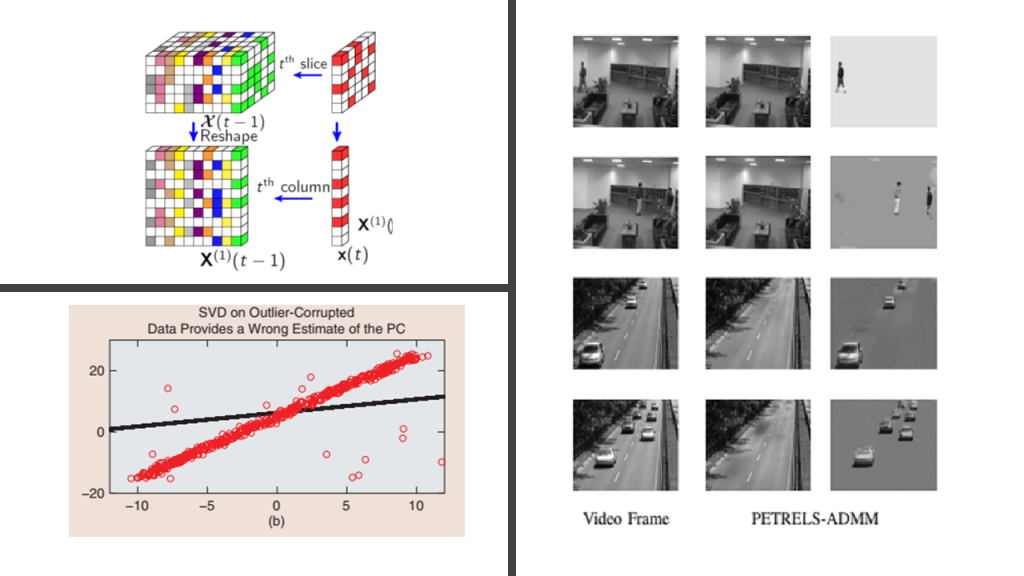
Research Projects
Robust and structured subspace tracking
Modern data analysis faces several challenges in real-life applications. Many real-life systems are required to make decision in (near) real-time while handling several streaming datasets in parallel. In many practical applications, impulsive noise and outliers appear in the data. Tensor datasets are expected to bring more versatile representation than conventional vector or matrix datasets, at the expense of high computational complexity. How to efficiently fuse data from several large-scale high-dimensional streaming data sources?
In data analysis, principal component analysis (PCA) is widely used for extracting low-dimensional subspaces from high-dimensional data. Subspace tracking, an important class of PCA, has drawn much attention. It is well-known that PCA is very sensitive to impulsive noise and outliers. PCA for impulsive noise and outliers is robust PCA. Robust PCA for streaming data is robust subspace tracking and is much more difficult.
The project aims to develop efficient data fusion methods and algorithms based on robust subspace tracking, for high-dimensional streaming data from several relevant sources affected by impulsive noise and outliers. We approach robust structured subspace tracking. Structured subspace tracking facilitates us to fuse data. When used with robust techniques, it helps deal with impulsive noise and outliers. We also want to illustrate and validate the developed methods and algorithms in biomedical signal processing and communications.

Selected publications
- Le Trung Thanh, Nguyen Viet Dung, Nguyen Linh Trung and Abed-Meraim Karim. Robust Subspace Tracking with Missing Data and Outliers: Novel Algorithm with Convergence Guarantee. IEEE Transactions on Signal Processing, 2021. [MATLAB Code]..
- Le Trung Thanh, Nguyen Thi Anh Dao, Nguyen Viet Dung, Nguyen Linh Trung and Karim Abed-Meraim. Multi-channel EEG epileptic spike detection by a new method of tensor decomposition. Journal of Neural Engineering, vol. 17, no. 1, pp. 016023, 2020.
- Le Thanh Xuyen, Le Trung Thanh, Nguyen Linh Trung, Tran Thi Thuy Quynh, and Nguyen Duc Thuan. EEG source localization: A new multiway temporal-spatial-spectral analysis. In 2019 NAFOSTED Conference on Information and Computer Science (NICS), Hanoi, Vietnam, December 2019.
- Le Trung Thanh and Nguyen, Viet Dung and Nguyen, Linh Trung and Karim, Abed Meraim. Robust subspace tracking with missing data and outliers via ADMM. 27th European Signal Processing Conference (EUSIPCO), September 2019, Spain. [MATLAB Code].
Other information
Co-PI: Dr. Nguyen Viet Dung, Group leader, AVITECH



